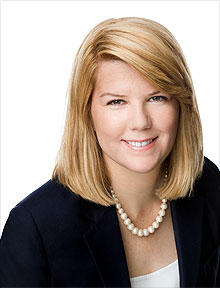Memo to Washington: Here's how to help retirees
Here's a retirement wish list the country can afford - without blowing a hole in the U.S. deficit.
 |
| Janice Revell is the author of "Revell's rules for retirement" for CNNMoney's Retirement guide |
(Money Magazine) -- When it comes to retirement, I've got a whole laundry list of issues I wish President-elect Barack Obama and his counterparts in Congress would tackle as soon as they are sworn in this month. But the U.S. deficit has hit record levels, so I'm trying to be realistic about what we can afford.
With that in mind, I'm paring down my retirement wish list to three things that can make a big impact - without blowing a hole in the nation's finances.
Don't force retirees to sell at the bottom. When you save in a traditional IRA or 401(k), you pay no taxes on the money you contribute and your investment earnings are sheltered from taxes during your working years. Once you reach the age of 70½, though, the IRS comes calling in the form of so-called required minimum distributions (RMDs). At that point you must start taking annual withdrawals from your 401(k) or traditional IRA (based on your life expectancy) and pay income tax on those funds. Fail to do this and the IRS will slap you with a nasty penalty.
Thanks to the vicious bear market, this rule is essentially forcing retirees to sell at the worst possible time. Even many ostensibly "safe" investments, like mutual funds designed to generate income for retirees, have plunged. Technically speaking, you can satisfy the law by simply transferring stocks, bonds or funds from your retirement account to a regular brokerage account. But you'll still owe taxes on the amount you transfer; as a practical matter, you may need to sell at least part of your investment to pay the taxes.
This is a rare issue upon which Obama and John McCain agreed during the campaign: They both proposed temporarily eliminating RMDs for two years. It's a good idea, and Congress should make it a priority (see editor's note). Yes, tax revenue will take a short-term hit. But the revenue won't disappear; it will simply be deferred.
Don't encourage workers to raid their 401(k)s. On the campaign trail, Obama proposed that all workers be allowed to withdraw up to $10,000 of their 401(k) balances in 2008 and 2009 without paying the usual 10% early-withdrawal penalty.
Such a rule would help people come up with cash in hard times. But this is one idea that President-elect Obama should back away from. The rate of early withdrawals from 401(k) plans is already far too high and the opportunity costs too steep. Almost half of workers who leave a job at some point cash out their 401(k) instead of rolling it over, according to a study by the Government Accountability Office. Offering extra inducements to raid a 401(k) is a dangerous policy.
To be sure, many people may need to tap their retirement plans as a last resort. But almost 90% of all workers participating in 401(k)s already have the ability to take out a loan or make a hardship withdrawal. Neither one of those options is painless, but that's the point: They're both better than indiscriminately allowing workers to make penalty-free withdrawals.
Dispel costly retirement myths. Here's something the new administration could do at practically no cost: beef up Social Security education so that people don't make bad decisions. One of the most costly mistakes seniors make surrounds the issue of working in retirement. Once you reach age 62, you're eligible to start collecting Social Security benefits. If you keep working, your check will be reduced by 50¢ for every dollar you earn above $13,560. The notion that you'll "forfeit" that benefit forever prompts legions of people to stop working at 62, says Andrew Biggs, a Social Security expert at the American Enterprise Institute and a former deputy commissioner of the Social Security Administration.
And that's a real shame because it's not true. Once you reach full retirement age (anywhere between 65 and 67, depending on when you were born), the size of your check is increased to make up for any benefit reduction you experienced. But don't expect to hear that from the Social Security Administration.
"They rarely mention it in publications or face-to-face meetings," says Biggs. "That's not good policy; we need to encourage people to keep working." This is the kind of low-hanging fruit the Obama administration can pluck right away.
Editor's note: In December, Congress passed a law that temporarily suspends in 2009 the rule requiring minimum distributions from IRAs and 401(k)s. ![]()


